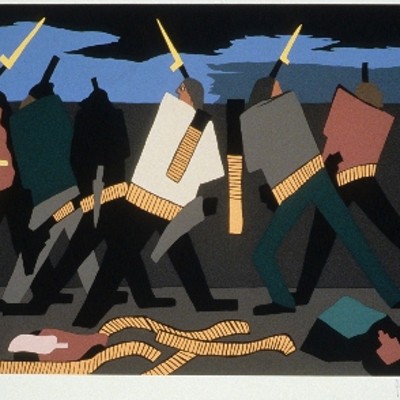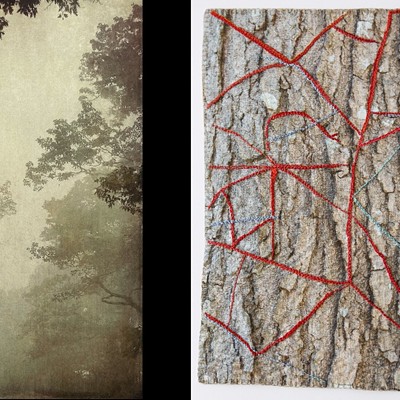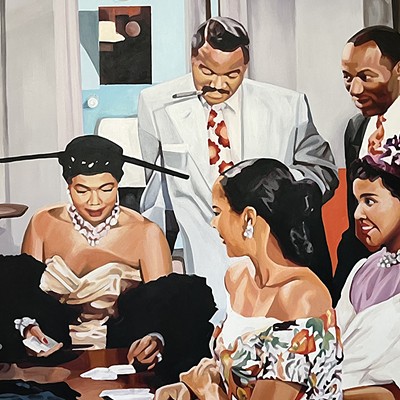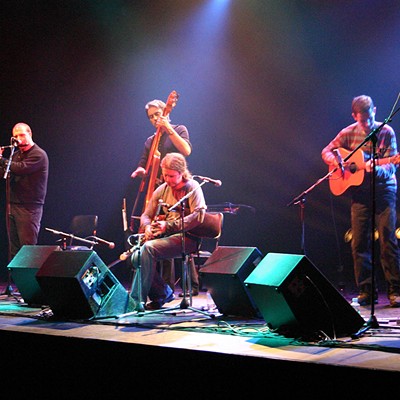"There's a lot of information on O'Conor," she said. "We have his own report, in his own handwriting. And once I got the book The Red Captain, by Mark Santiago, I felt strongly there was enough information for the piece."
Callery was here to do the final research on the strange but true drama about the red-haired Irishman who founded the presidio of Tucson for the Spanish crown in 1775. She visited the Arizona Historical Society, the UA Library's Special Collections and the Arizona State Museum, and checked in at the restored Tucson Presidio downtown. And she traveled down to Nogales to visit Father Kieran McCarty, the beloved retired historian whose work on Spanish Colonial Tucson is essential to an understanding of O'Conor and his world.
"They've all been fantastic," she declared. Armed with all the data, she headed back to Roscommon, the home county she shares with the descendants of O'Conor, to complete the play in time for a premiere around St. Patrick's Day.
"I'm on the final draft, the final details," she said then. "We'll start rehearsals in late November in Ireland."
Right on schedule, El Capitán Colorado debuts this weekend in three different locations, just in time for Tucson's annual celebration of all things Irish (see list below). Commissioned by Tucson-Roscommon Sister Cities, the drama is acted by three imported Irish actors and directed by their countryman Gus Hanley.
Callery, an actress and author of numerous plays, says she strived to re-create the historical truth of the tale, but she also had to shape it into a work of art.
"I have a love of history, but I'm not a historian," she said. "I do research, but I take artistic license and delve into character and story. In theater, you can use old tales to tell a modern story."
Hugh O'Connor was just 16 when he left Ireland, never to return. He came from a high-ranking Roscommon family, Callery notes, but as a Catholic and an Irishman, he was subject to the draconian penal laws enacted by his country's British colonial masters. Forbidden by law to engage in any profession, or even to practice his religion, he was one of many ambitious young men who fled their native country. The flocks of émigrés were called the Wild Geese (na Geana Fiadhaine, in Irish). Many, like O'Conor, signed on to serve the Spanish king, a bitter enemy of the English.
As an officer in the Spanish army, O'Conor served mostly on the northern borderlands of New Spain. His Irish "Hugh" evolved into the Spanish "Hugo," and he earned the nickname El Capitán Colorado--the Red Captain.
"He had red hair; he was arrogant and fiery," Callery explains.
He was given the task of finding suitable defensive locations for forts along the northern frontier. For the new Tucson presidio, says the playwright, "O'Conor selected a site by an Indian village, where there was water (the still-flowing Santa Cruz) and some woodland. He stayed a few days only."
But his health was ruined by the rigors of military frontier life, and he died in Mérida four years later, without ever seeing Ireland again.
Part of what interested her about this tale, Callery said, is "the different cultures and how they met." Her actors portray the Irish soldier, a Spanish missionary and an Indian woman, with "each of the characters represent(ing) different cultures." The play is in English, but Callery included some lines in Irish, in Apache and in Spanish.
One of the story's ironies is that O'Conor "carried out on the Native Americans what England was doing to his people in Ireland. I try to tell the story as I see it, in all its complexities. I don't try to be a judge. People can take their own meaning and inspirations."
Reached in rainy Ireland early this week, Callery said the theatrical troupe planned to arrive in sunny Tucson on Tuesday, Feb. 26.
"Really looking forward to getting over there again," she said via e-mail. "Weather here is dismal as always."
There's lots more Celtic craic (that's Irish for good times) to be had in Tucson this St. Patrick's season. To wit:
Emerald Ball, 6 p.m., Saturday, March 1, Skyline Country Club, 5200 E. St. Andrew's Drive, near Skyline Drive and Swan Road. The 14th annual black-tie optional ball, put on by the Emerald Isle Society, offers up dinner, ceili dancing to The Mulligans of Los Angeles, a raffle and a performance by Michael Patrick Gallagher, former Riverdance star. The $125 ticket includes a donation to the Tucson Alliance for Autism and The Tucson Ulster Project for Children. 722-1018; emeraldislesociety.org.
Second Annual Gala Irish Music Concert, 7:30 p.m., Wednesday, March 5, Fox Tucson Theatre, 17 W. Congress St. Two Irish bands--one local and one straight from the Old Sod--and a troupe of Tucson step-dancers join forces for this pre-St. Patrick's Day kickoff. Hailing from West Mayo, the David Munnelly Band musicians claim connections to a host of major Irish groups: They've played individually with The Chieftains, DeDanaan, Danú and others. They're led by button-accordion player Munnelly. Brother Kieran Munnelly handles flute and bodhrán; Paul Kelly, fiddle and mandolin; Daire Bracken, fiddle; Tony Byrne, guitar. The singer is Shauna Mullin of Donegal. Local band Round the House, winner six years running at the Tucson Area Music Awards (TAMMIES) for Traditional/Ethnic band, delivers Irish tunes inflected by Tucson. Students of the Maguire Academy of Irish Dance step lively. Tickets ($15, $18, $36 for balcony love seats) are available at the box office, at 547-3040, ext. 2, or foxtucsontheatre.org.
Cara Concert, 8 p.m., Friday, March 7, Berger Performing Arts Center, 1200 W. Speedway Blvd. In a multicultural twist, this Celtic band is straight from Germany. The five Deutsch dudes and dudettes (with such names as Gudrun, Claus and Jorgen) play traditional Irish; Breton music from Brittany, the Celtic corner of northwest France; and original tunes of their own. Their indisputably Irish instruments include flute, whistles, fiddle, uilleann pipes, concertina and bodhrán. The busy hoofers of the Maguire Academy of Irish Dance turn out once again for stepping and soft-shoeing. $20 general, $18 for seniors and Tucson Kitchen Musicians Association members; $3 more at the door. Tickets are available at Antigone Books, 411 N. Fourth Ave., 792-3715; The Folk Shop, 2525 N. Campbell Ave., 881-7147; and online at inconcerttucson.com, or 981-1475.
St. Patrick's Day Parade and Festival, 10 a.m. to 5 p.m., Sunday, March 16, streets of downtown and Armory Park, 220 S. Fifth Ave. Celebrating one day ahead of the big feast, the free festival unfolds all day long at the park, starting at 10 a.m.; musicians perform on stage, and vendors sell Celtic wares and foods. The parade begins at 11 a.m. and winds through downtown, ending at the park. Don't miss the float by the Sisters of Perpetual Indulgence or the grand finale with the saint himself marching Tucson's streets, coincidentally enacting this year's theme, St. Patrick in the Old Pueblo.
Annual Mayors' Lunch, noon, Monday, March 17, Manning House, 450 W. Paseo Redondo. The mayors of the two Sister Cities, John Kelly of Roscommon and Bob O'Walkup of Tucson, convene for a meal and entertainment. The Hugh O'Connor Pipers pipe hizzoners in; at press time, rumor had it that mariachis would provide some counterbalancing Mexican música. $26 members; $32 nonmembers. 770-0714; manninghouse.com.














